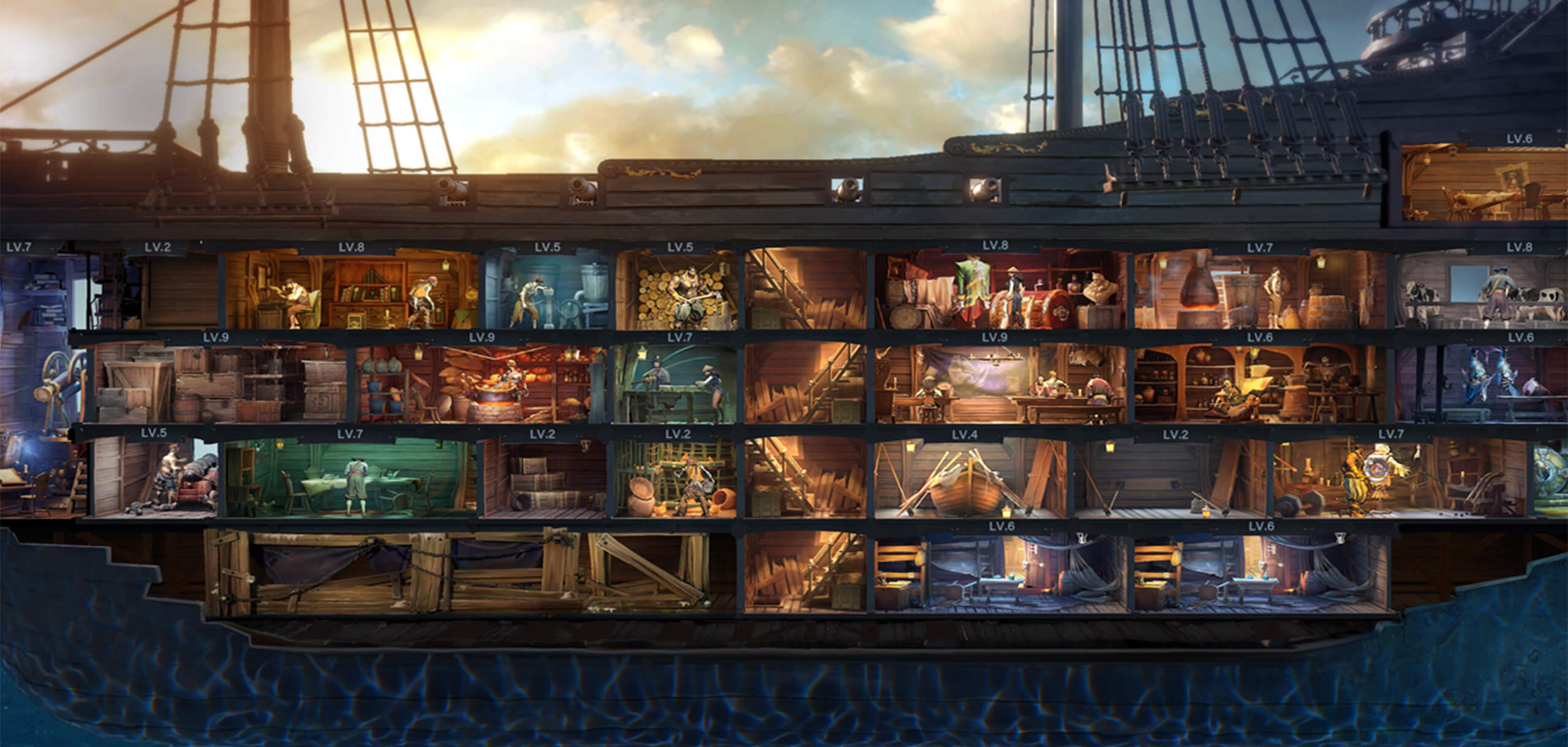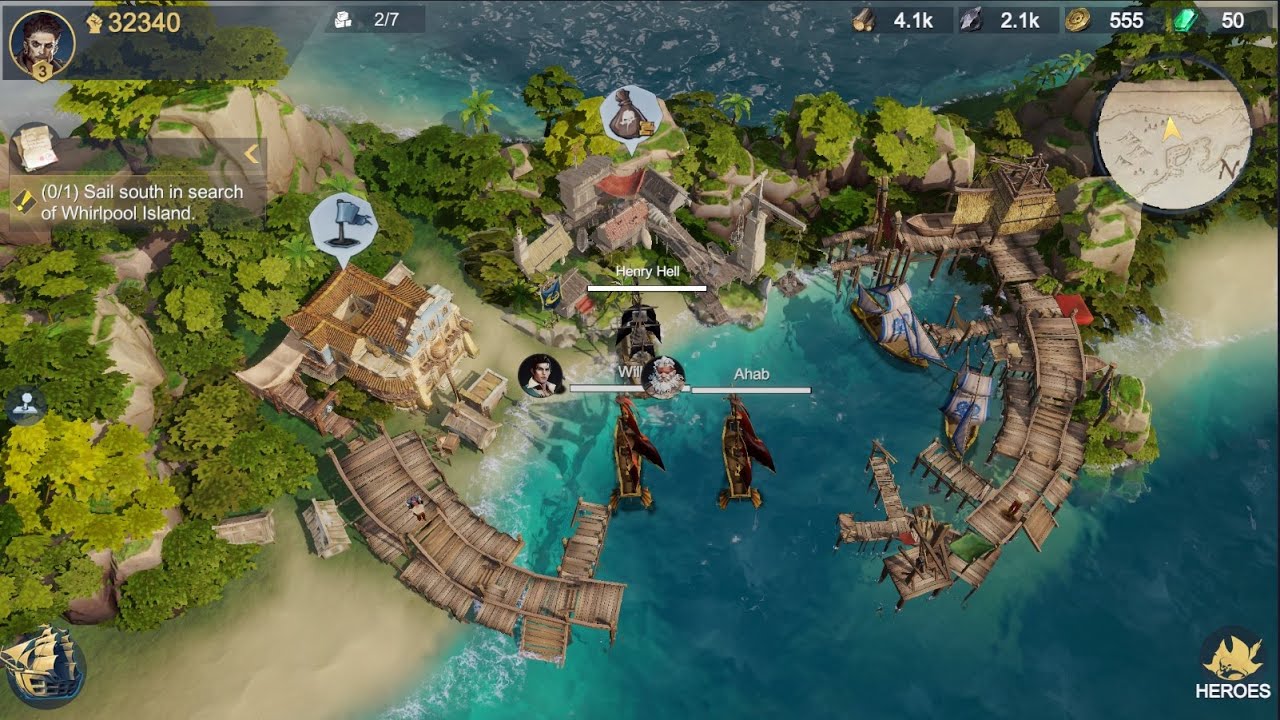
Sea of Conquest
| Genre: Strategy MMORPG |
| Rating: |
Sea of Conquest Review: Sail, Scheme, Survive — And Maybe Just Rule the Seas
Let’s get one thing out of the way—Sea of Conquest doesn’t just flirt with being a pirate fantasy. It jumps headfirst into it, boots and all. The moment you step aboard your first ship, there's this gut-level shift that happens. You’re not just playing a game. You’re navigating layered power plays, uneasy alliances, and more cannon fire than a summer blockbuster.
So, is it worth raising your sails and spending your evenings managing a floating empire while dodging enemy fleets and whisper campaigns? Let’s talk about it—warts, wonders, and all.


First Impressions: Weathered Maps and Fire in the Sky
The game doesn’t do subtle.
From the first loading screen, it’s a roaring symphony of salt-spray aesthetics and cinematic drama. We’re talking giant sea serpents, warships creaking under the weight of ambition, and cutthroat characters with more baggage than a storm-battered port.
But here’s the kicker—it works. It’s loud, it’s grand, and it doesn’t pretend to be anything else. The art direction leans heavily into a stylized realism; ships are detailed without being fussy, characters look like they’ve lived through a few things, and the sea itself? She’s alive. Moody skies, glowing currents, storms rolling in with zero warning—it’s beautiful chaos.
Plot Hooks and Player Agency: More Than Just Fetch Quests
Now, if you're hoping for a "follow the dotted line" kind of story... well, you’ll find that here too. But Sea of Conquest quickly reveals it has teeth beneath the surface.
Sure, the campaign has its structured moments—plenty of missions, pirate lore, and colorful personalities to bump elbows with. But the magic? It’s in the choices. Align with a morally grey admiral for short-term gain or stick to your own (questionable) code? Break a fragile treaty just to sack a rival fleet? The game never stops asking: how far are you willing to go?
Even the side missions—usually filler content in other games—feel deliberate here. There’s a real sense that the world reacts. Save a scrappy island village? You might earn unexpected reinforcements later. Betray a shady merchant? Expect word to spread fast.
It’s less about ticking boxes and more about weaving your own brand of chaos into the world.
Combat That’s Anything But Shallow
Okay, let’s talk ship combat.
You might assume it’s all cannonballs and basic broadsides. But Sea of Conquest throws in just enough complexity to keep things spicy without overwhelming you with naval micromanagement. It's a mix of real-time strategy and positioning—like a chess match where your bishops fire mortars.
Each ship type has its own feel. Galleons? Tanky and slow. Frigates? Fast but fragile. Your loadout matters, and not just for aesthetics. Weapon placement, crew distribution, and even wind direction play into how each skirmish unfolds.
The best part? It’s messy in a good way. Fights feel tense. You’ll curse the wind one minute and pull off a perfect flanking shot the next. It’s that kind of rollercoaster—and it rarely gets old.
World-Building: More Than Just Ocean Between Ports
Here’s something unexpected—Sea of Conquest doesn’t just throw a few islands into the mix and call it a map. The world is layered.
There are bustling trade hubs, cursed fog-covered reefs, ancient ruins that whisper of forgotten empires... and they all have their own stories. Each port has its own local politics, rumors, and subcultures. It's not just background decoration; it feels lived-in.
One minute you’re eavesdropping in a smoky tavern about a ghost ship near the Crimson Shoals, the next you’re knee-deep in a subplot involving smuggling routes and rival cartels.
The game excels at rewarding curiosity. Sail off the beaten path and you’ll find secrets—some useful, some deadly, and a few just plain strange. (Don’t ask about the talking monkey. Just... don’t.)
Characters You Actually Care About (Even When You Shouldn’t)
You’d expect a game like this to have some memorable faces—and oh boy, it delivers.
From the grizzled veteran navigator who’s seen too much, to the young stowaway with secrets of their own, Sea of Conquest takes its character work seriously. They’re flawed, funny, sometimes maddening—but they never feel flat.
Conversations don’t feel like checklist interactions either. There's depth here. Dialogue choices affect relationships and outcomes. And yes, sometimes you’ll say something that sounds good in the moment... and regret it later when that same character betrays you mid-battle.
It’s the emotional whiplash we didn’t know we needed.
Managing Your Fleet: It’s Complicated (in the Best Way)
You know how some games throw base-building or management in just to pad the experience? This isn’t that.
Managing your fleet is genuinely satisfying. It’s part logistics puzzle, part vanity project. You’ve got to balance resources, morale, repairs, crew roles, and even supply chain logistics. But it’s never busywork. Every decision ripples outward.
Do you invest in long-range cannons for your flagship or outfit a scout ship for stealth? How do you rotate your tired crew without leaving yourself vulnerable? It’s less spreadsheet simulator, more tactical chess match where every piece has personality.
And the customization? Chef’s kiss. From sails and figureheads to onboard weaponry and hull paint, you can make your fleet truly yours. It's not about chasing numbers—it’s about telling your story through your ships.
PvP Shenanigans and Wild Online Encounters
Let’s be honest—open-world PvP can make or break a game. But here? It’s a powder keg you actually want to light.
When you’re sailing through contested waters, knowing any ship on the horizon could be friendly... or very, very not? That tension is real. And the community? Surprisingly clever. We’re talking betrayals mid-alliance, impromptu pirate duels, and entire player-organized sea blockades.
Yes, it can be brutal. Yes, you’ll occasionally get ambushed and lose everything. But it never feels unfair—it feels earned. And sometimes, even hilarious. There was one time a group of players trapped a rival captain in a “courtroom” scenario, complete with fake jury and sea-chantey interruptions. Pure chaos. Peak creativity.
That emergent storytelling? That’s the kind of stuff no developer can script. It just happens when you give players the right tools and enough seawater madness.
Sound and Score: The Wind Sings (Sometimes Literally)
Sound design can make or break immersion, and Sea of Conquest nails the vibe.
The creak of boards underfoot, distant thunder echoing across the bay, the rattle of chains as you weigh anchor—it’s not just background noise. It’s atmosphere. There’s even subtle variation depending on your ship type and weather. Stormy seas feel heavy. Calm nights feel eerie.
And the music? A surprisingly rich mix of orchestral swells and regional folk elements. Sometimes it disappears entirely, letting the world breathe. Other times it kicks in with spine-tingling urgency. Either way, it knows when to step back and when to take center stage.
Interface and Quality of Life: Surprisingly Smooth Sailing
Alright, let’s talk usability—because all the immersion in the world won’t matter if the game plays like a wet sock.
Thankfully, Sea of Conquest avoids most of the usual traps. Menus are clean. Tutorials are helpful without being overbearing. Even the more complex systems (looking at you, crew management) are introduced gradually, so you’re not buried under a wave of stats and systems from the jump.
And controller support? Surprisingly tight. Whether you're playing on mobile, tablet, or PC, everything feels intuitive—like it was made for your hands, not just your eyes.
The Grind Question (Because We Know You're Wondering)
Here's the thing—yes, there’s progression. Yes, you’ll need to collect resources, upgrade ships, and earn reputation. But does it feel like a grind?
Not really.
Because the world is so reactive, every task—whether it’s ferrying supplies or hunting treasure—feels like it matters. You’re rarely just “doing chores.” You're shaping a story, whether it's yours, your crew’s, or that of a dying port clinging to relevance.
The only caveat? If you’re the type who needs instant payoff... well, let’s just say this game rewards the long haul.
Minor Gripes (Let’s Not Pretend It’s Perfect)
No game’s flawless, right?
There are moments when the pacing slows to a crawl—usually around mid-tier missions where you’re asked to collect this or investigate that. A little too “go here, now go there” for our taste.
And while the map is expansive, sometimes it feels too expansive. A few fast-travel tweaks or dynamic events could help reduce the dead zones.
Also, occasionally—just occasionally—the AI pulls a move that makes zero sense. Like, why is that ship ramming a rock at full speed while yelling about honor?
But hey, it’s the kind of rough edge that’s more funny than frustrating.
So… Should You Set Sail?
Here’s the thing: Sea of Conquest isn’t just a pirate game. It’s a power fantasy layered with drama, strategy, and just enough chaos to make every session unpredictable.
It’s not always fast-paced. It asks for your attention. It wants you to think before you act. But in exchange, it offers moments you’ll remember—betrayals you didn’t see coming, victories you barely scraped through, alliances that felt real.
If you're the kind of player who likes their strategy served with a splash of roleplay and a dash of glorious unpredictability? Sea of Conquest isn’t just worth trying. It’s worth sticking with.
Because sometimes the sea’s not just calling. It’s roaring.